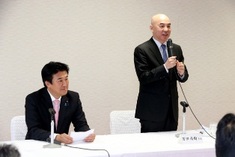 www.asahi.com
www.asahi.com Why Japan and Australia should/should not become allies
In favour of an alliance:
1. Both countries are democracies, with respect for the rule of law
2. Both are allies of the US, and so have a mutual ‘major benefactor’ and a history of operating with one another in conjunction with the US
3. Have enjoyed over 60+ years of progressive economic and diplomatic relations
4. Have mutually beneficial aspects to their economies – Japan in manufacturing, Australia in raw materials
5. Personal relations between citizens of both countries are cordial and friendly
6. Both nations depend heavily on seaborne trade, and have interests in maintenance of freedom of navigation on the sea
7. Both nations engage in and assist one another in humanitarian and disaster response exercises and operations in the Pacific and further abroad
8. Both nations belong to major multilateral regional forums and organisations, and pursue similar policies in these institutions
Against an alliance:
1. Japan has territorial issues with other major Asian nations that could drag Australia into a regional conflict against its interests
2. An alliance with Japan would gravely upset China, creating tension with Australia’s largest trading partner
3. It is not an even partnership – Japan has a vastly larger military with greater capabilities than Australia’s. Australia would not bring much to the table in terms of capabilities that Japan couldn’t already get from its alliance with the US
4. Domestic populations of both countries have not explored the possibility of an alliance, and it would be unlikely to have much support. Japan’s population is still wrestling with the implications of collective self defence, hence an alliance would be too much, too soon
5. Historically, Australia has never had a major alliance with a nation in Asia. Setting a precedent takes strong political will and a strong majority in parliament, and that is not be available at present
6. Historically, Japan has relied solely on its alliance with the US for its security for the past 60+ years. It has no recent history of an alliance outside of that with the US, and Australia’s regional relations (i.e., its exposure to China’s economic influence) might cause Tokyo to hesitate pursuing any closer ties
Questions on Freedom of Expression
To continue, in the past week Japan, and Japan's media in particular, have been wrestling with questions related to the freedom of expression as it is practised in Japan - in particular the degree of commitment that certain parliamentarians and commentators have to Article 21 of the Japanese Constitution.
The first of these controversies occurred in the wake of PM Shinzo Abe’s visit to Okinawa last week to attend a commemoration ceremony marking the 70th anniversary of the Okinawa campaign. In the course of delivering his speech, PM Abe was heckled by members of the crowd angry at his government’s move to change the interpretation of Article 9 of the Constitution and recognise collective self defence, in addition to the federal government’s stubborn determination to continue constructing new military facilities at the Henoko site in northern Okinawa despite opposition from Okinawan governor Onaga Takeshi.
Local Okinawan newspapers, namely the Ryūkyū Shinpo and the Okinawan Times, have been strong supporters of the anti-base movement and of the position taken by Governor Onaga. This appears to have made them targets of comments attributed to Hyakuta Naoki, a right-wing author and commentator with close ties to the Abe administration. At a study session of young members of the LDP (the so-called “Culture and Arts Study Group”), Hyakuta, as an invited guest, said that both newspapers “should be crushed” (J), a statement he later claimed was made in jest and that was off the record.
Hyakuta’s commentary was controversial enough for PM Abe to have to come out to reinforce his government’s support for freedom of the press and note the role of freedom of expression as a fundamental pillar of democracy (J). Nevertheless, the same study session also saw, Kihara Minoru, head of the Young LDP, state that restrictions should be placed on the media (J). This set of a wave of criticism within the media of both Kihara and the LDP when it was made public, so much so that LDP executive was forced to suspend Kihara’s chairmanship of the study group (J) and once again reiterate the government’s commitment to all forms of democratic expression (J).
Memories of the restrictions on reporting imposed on newspapers during the early Shōwa era still abound in Japan, hence any mention of restricting the public’s right to information is met with incredulity and anger both by media organisations themselves and the wider public. Given Japan is still debating the implications of collective self defence, to have members of the government and their affiliates start discussing limitations on the “right to know” was poor timing, to say the least.
Polls released by the Nikkei Shimbun this week indicate that PM Abe is having a hard time selling the concept of collective self defence to the Japanese population, hence any suggestion that the government might contemplate shutting down any criticism of its policies would naturally be a cause for grave concern. While this issue might fade away, it will remain at the back of many minds both within the media and academia concerned about the direction the domestic debate on self defence has taken and whether the Abe government’s intentions are being revealed to the public in full.
 RSS Feed
RSS Feed